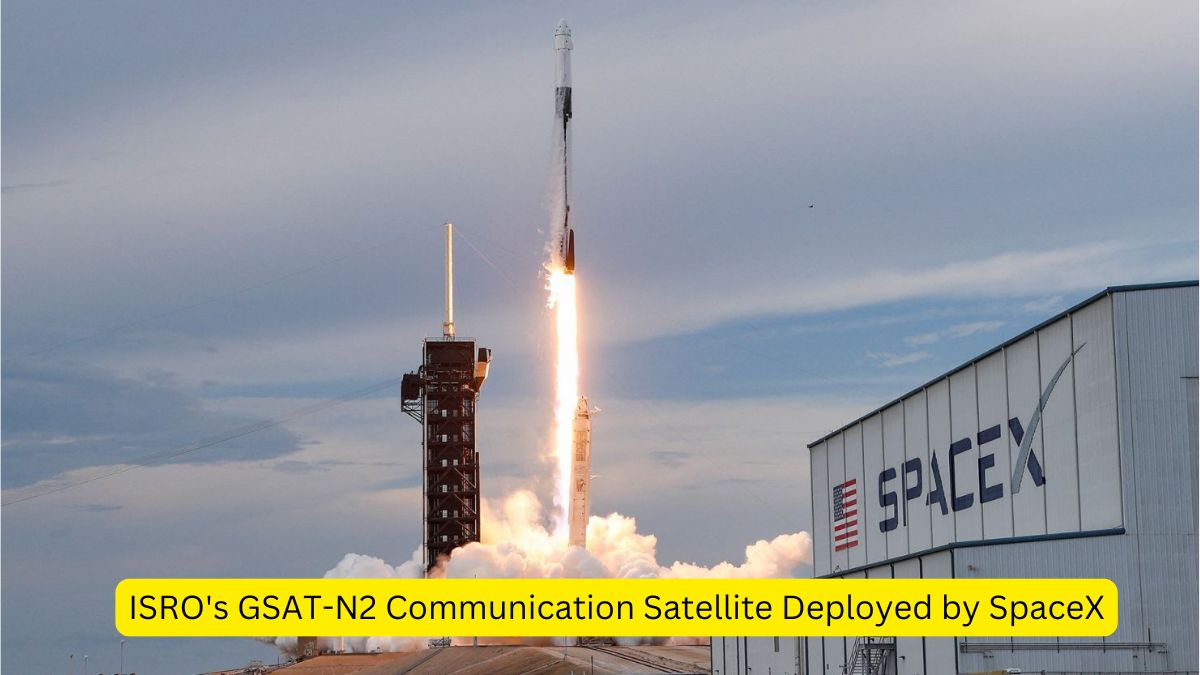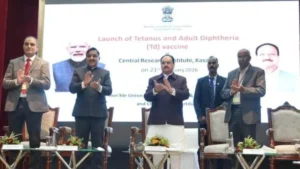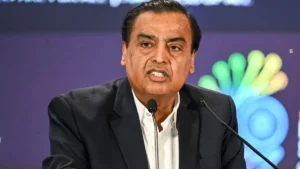On November 18, 2024, SpaceX successfully launched the Indian Space Research Organisation’s (ISRO) GSAT-N2 communication satellite from Canaveral Space Force Station in Florida. This advanced satellite, designed to enhance broadband connectivity and support India’s Smart Cities Mission, was carried aboard SpaceX’s Falcon 9 rocket. Marking the first commercial collaboration between ISRO and SpaceX, the launch demonstrates India’s growing reliance on international partnerships to achieve its ambitious space and technological objectives.
Overview of GSAT-N2 Satellite Launch
- Event: SpaceX successfully launched ISRO’s GSAT-N2 communication satellite on November 18, 2024.
- Launch Site: Canaveral Space Force Station, Florida.
- Launch Vehicle: SpaceX’s Falcon 9 rocket.
- Significance: Marks the first commercial collaboration between ISRO and SpaceX.
Key Features of GSAT-N2 Satellite
- Developed By: ISRO’s Satellite Centre and Liquid Propulsion Systems Centre.
- Primary Use: Enhancing broadband services and providing in-flight connectivity across India.
- Data Transmission: High-throughput satellite with a capacity of 48 Gbps.
Beams
32 User Beams,
- 8 narrow spot beams for Northeast India.
- 24 wide spot beams for the rest of India.
Supported by hub stations in mainland India.
- Payload: Equipped with Ka-Band HTS communication technology.
- Lifespan: Expected operational period of 14 years.
- Supports: India’s Smart Cities Mission and national communication infrastructure.
Reason for Choosing SpaceX
Payload Constraints
- GSAT-N2 weighs 4,700 kg, exceeding the capacity of India’s LVM-3 (4,000 kg).
- Traditional partner Arianespace lacks operational rockets for such heavy payloads.
- Solution: SpaceX’s Falcon 9 rocket offered a viable option for the mission.
Technical Highlights
- Satellite Weight: 4,700 kg.
- Capacity: Ka-Band HTS with 48 Gbps throughput.
- Coverage: Nationwide, with specialized focus on the Northeast region.
- Infrastructure: Ground support through hub stations in India.
Significance of GSAT-N2
- Broadband Connectivity: Strengthens high-speed internet services nationwide.
- In-Flight Connectivity: Supports communication for aviation.
- Smart Cities Mission: Provides critical infrastructure for urban digital initiatives.
- Communication Boost: Expands the GSAT satellite series’ role in India’s development.
- Commercial Collaboration between ISRO and SpaceX
- Historical Importance: First of many potential collaborations between the two entities.
Advantages
- Access to advanced launch technologies.
- Cost-effective solutions for heavy payload launches.
Quotes from Key Figures
Radhakrishnan Durairaj, CMD, New Space India Limited,
- Confirmed GSAT-N2’s precise placement in orbit.
- Highlighted SpaceX’s role in overcoming launch challenges.
| Summary/Static | Details |
| Why in the news? | SpaceX successfully launched the Indian Space Research Organisation’s (ISRO) GSAT-N2 communication satellite |
| Launch Site | Canaveral Space Force Station, Florida. |
| Launch Vehicle | SpaceX’s Falcon 9 rocket. |
| Significance | First commercial collaboration between ISRO and SpaceX. |
| GSAT-N2 Satellite: Key Features | Developed By – ISRO’s Satellite Centre and Liquid Propulsion Systems Centre.
Primary Use – Enhancing broadband services and providing in-flight connectivity across India. Data Transmission – High-throughput satellite with 48 Gbps capacity. Beams – 32 User Beams: 8 narrow spot beams (Northeast India), 24 wide spot beams (Rest of India). Payload – Equipped with Ka-Band HTS communication technology. Lifespan – 14 years. Support – India’s Smart Cities Mission and national communication infrastructure. |
| Significance of GSAT-N2 | Broadband Connectivity
In-Flight Connectivity Smart Cities Mission Communication Boost |



 Made in India: Nadda Launches Indigenous...
Made in India: Nadda Launches Indigenous...
 Reliance Announces ₹10 Trillion AI Inves...
Reliance Announces ₹10 Trillion AI Inves...
 GalaxEye’s AI-Powered OptoSAR Satellite ...
GalaxEye’s AI-Powered OptoSAR Satellite ...








